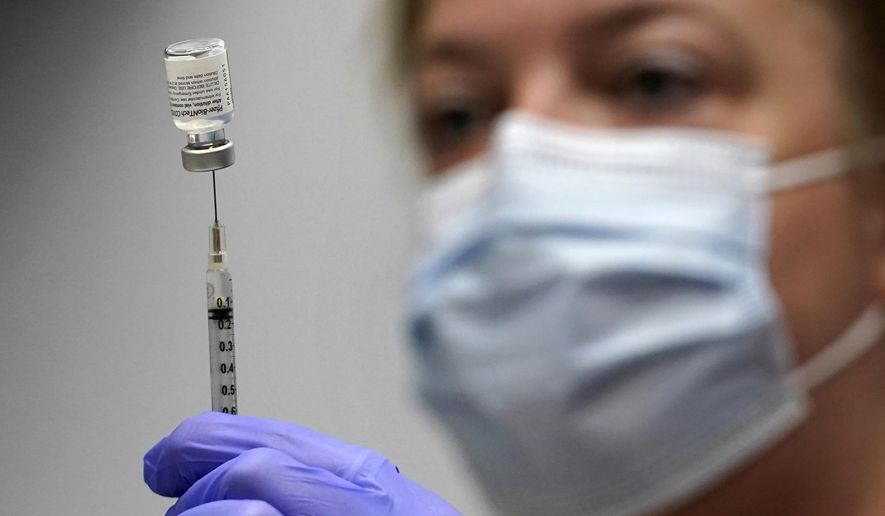The Food and Drug Administration’s full approval of Pfizer’s COVID-19 vaccine this week will throw a wrench in lawsuits that challenge the legality of vaccine mandates, according to legal experts.
Students and employees have launched legal battles across the country complaining of universities and employers requiring them to get the jab, with many of the suits citing the incomplete FDA approval status of the vaccines.
But that argument took a hit Monday when the government agency announced Pfizer, one of three COVID-19 vaccines currently offered in the United States, has been given full authorization.
“Full FDA approval helps bolster the legality of a vaccine mandate,” said Leslie Jacobs, a law professor at the University of the Pacific. “It takes that argument away from the objectors.”
Until Monday, the three COVID-19 shots offered by Pfizer, Moderna and Johnson & Johnson have only received emergency use approval.
Legal scholars said it was an open question for the courts about whether a vaccine can be required when it had only received emergency approval through the FDA. But the legal landscape changed when Pfizer got its full approval this week for its COVID-19 shots for individuals 16 and older. Children under 16 are still being studied.
“The approval makes a big difference legally, and is going to be a real barrier to most of the lawsuits I’m following,” said Dorit Reiss, a professor at UC Hastings College of the Law.
There is a 100-year-old Supreme Court precedent for mandating vaccines. The high court said a state had the right to require smallpox vaccines in 1905 in the case of Jacobson v. Massachusetts.
Though lawsuits filed before the FDA’s recent announcement have been citing the caveat that the COVID-19 shots were only cleared for emergency use and thus shouldn’t be required, courts had been rejecting that premise.
A Texas hospital won its case after employees challenged a requirement that all health care workers there be vaccinated earlier this year. The Texas case alleged the vaccines had not yet been fully approved by the FDA so they shouldn’t be mandated but the court rejected that argument.
Earlier this month, Supreme Court Justice Amy Coney Barrett also refused to block a COVID-19 vaccine mandate for students at Indiana University ahead of them returning to class for the fall 2021 semester. Lower courts had also upheld the requirement.
The lawsuit is still pending before the Northern District of Indiana.
James Bopp, the lawyer representing the students, said the FDA’s status of the vaccine wasn’t a legal argument, but rather a fact surrounding the litigation.
“We are saying when the government mandates a vaccination, that violates constitutional rights,” he said.
Mr. Bopp also noted the Supreme Court’s 1905 case was decided before courts recognized current rights like the right of bodily integrity and autonomy in medical choices, which weren’t honored in 1905.
Mary Holland, president of Children’s Health Defense, a nonprofit health advocacy group that is helping lead a lawsuit with students challenging Rutgers University’s vaccine mandate, said the FDA’s move doesn’t change their case either.
Her lawsuit is based on a number of claims against the school — like officials first telling students the shots wouldn’t be required — but one argument was based on the lack of FDA approval for the COVID-19 shots.
“We included language in the complaint to provide for the possibility of licensure; the licensure of a single vaccine does not in any way fundamentally change our lawsuit. Furthermore, as the letter to Pfizer yesterday points out, there are limited supply of the “Comirnaty” Pfizer vaccine, the licensed product, and most of what is available, the Pfizer-BioNTech is still Emergency Use Authorization Pfizer stock, so the contours of our case have not changed,” she said.
The FDA’s clearance has also opened the floodgate for more mandates.
The Pentagon announced it would now require the vaccine hours after the FDA made its announcement on Monday. New York City also said it would mandate public education employees get at least one shot by Sept. 27.
Some universities, hospital systems, and airplane companies had also said they would be requiring the shots once the FDA did grant full approval.
Moderna is still waiting for full FDA approval. Johnson & Johnson got a later start than the other two vaccines and has not yet filed for full FDA approval.
• Tom Howell Jr. contributed to this story.
• Alex Swoyer can be reached at aswoyer@washingtontimes.com.




Please read our comment policy before commenting.